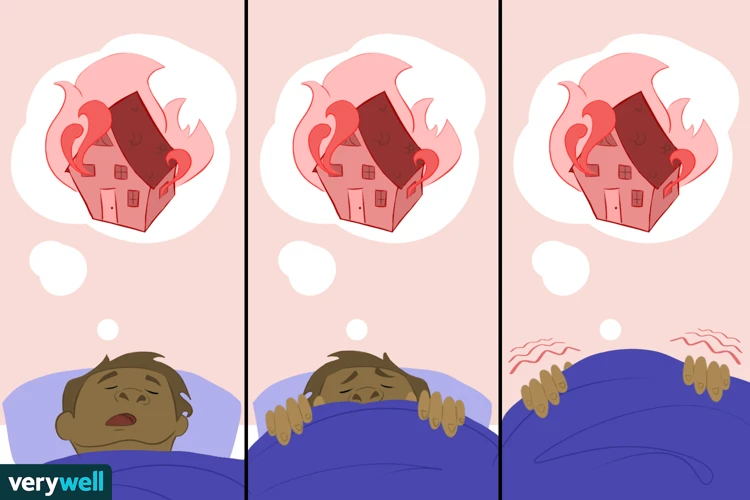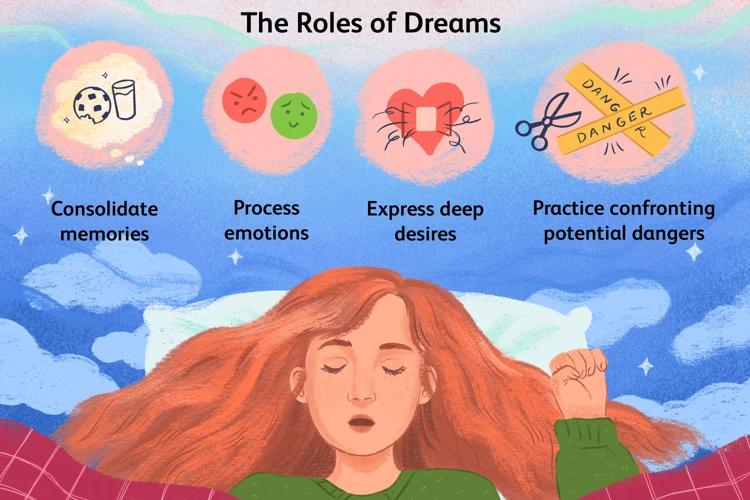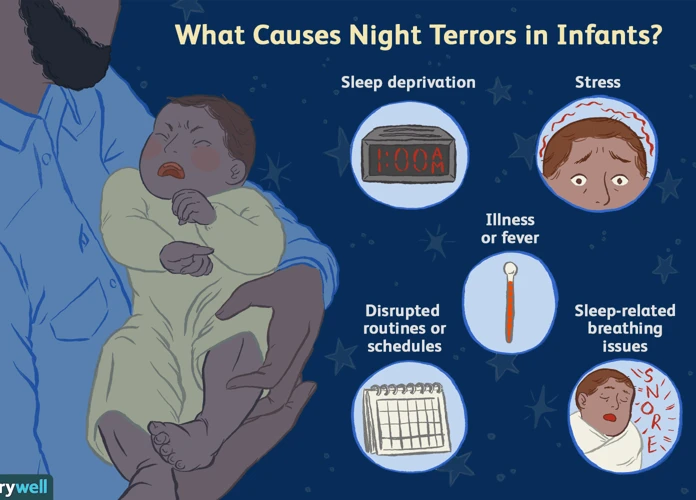Nightmares: Unraveling the Mysteries of Our Troubled Sleep
Nightmares have haunted the human psyche since the dawn of time. These harrowing dreams can leave us terrified, disoriented, and even questioning our own sanity. But what exactly are nightmares, and why do we experience them? In this article, we will delve deep into the causes of frequent nightmares, exploring both common triggers and underlying medical conditions that can contribute to their occurrence. By understanding the root causes of these nocturnal terrors, we can better equip ourselves to prevent and cope with them, ultimately reclaiming our peaceful slumber. So grab a cup of chamomile tea, dim the lights, and let us embark on this journey to unravel the mysteries of our troubled sleep.
What are Nightmares?

Nightmares are intensely disturbing dreams that can cause feelings of fear, anxiety, and distress during sleep. These unsettling experiences often involve vivid and realistic scenarios that evoke strong emotional responses. Nightmares typically occur during the rapid eye movement (REM) stage of sleep, which is when our most vivid and memorable dreams take place. Unlike regular dreams, which can be strange or fantastical, nightmares are characterized by their deeply distressing nature, often involving themes of danger, violence, or helplessness. The content of nightmares can vary widely from person to person, but common themes include being chased or attacked, experiencing a life-threatening situation, or witnessing a tragic event. Nightmares can leave individuals feeling shaken and uneasy upon waking, and their effects can linger throughout the day, impacting mood, concentration, and overall well-being. Understanding the nature of nightmares is the first step in unraveling their underlying causes and finding effective strategies for prevention and management.
To gain a deeper understanding of the mysteries of nightmares, let’s explore some of the potential causes and triggers behind these unsettling nighttime experiences.
The Importance of Dreaming

Dreaming is an essential part of our sleep cycle and plays a crucial role in our mental, emotional, and even physical well-being. While the exact purpose of dreaming remains a subject of debate among researchers, there are several proposed theories regarding the importance of this nighttime activity. One prevalent theory suggests that dreaming serves as a way for our brains to process and consolidate information from the day, aiding in memory formation and learning. During REM sleep, the stage of sleep when vivid dreams occur, the brain is highly active, with increased neural connections and activity in various regions. This heightened brain activity during dreaming may be linked to the integration and organization of memories, as well as the exploration of emotional experiences. Dreams provide a platform for wish fulfillment, allowing us to engage in scenarios and experiences that may be unattainable or restricted in waking life. Dreaming can facilitate creativity and problem-solving by providing a space for our minds to explore new ideas and perspectives. Additionally, dreams can serve as a release valve for pent-up emotions, allowing us to process and express feelings that may be suppressed or unconscious. Understanding the importance of dreaming underscores the significance of maintaining healthy sleep patterns and addressing factors that can disrupt the dream process, such as frequent nightmares.
Common Causes of Frequent Nightmares

There are several common causes that can contribute to the occurrence of frequent nightmares. 1. Stress and Anxiety: High levels of stress and anxiety can disrupt the quality of sleep and lead to an increased likelihood of experiencing nightmares. Stressors such as work pressure, relationship issues, or financial troubles can manifest in our dreams, creating unsettling scenarios. 2. Traumatic Experiences: Individuals who have experienced trauma, such as physical or emotional abuse, accidents, or natural disasters, may be more prone to experiencing frequent nightmares as their subconscious attempts to process and come to terms with the traumatic events. 3. Medications and Substance Abuse: Certain medications, such as antidepressants or blood pressure medications, have been known to cause vivid and disturbing dreams, including nightmares. Additionally, substance abuse, particularly alcohol and drugs, can disrupt the sleep cycle and contribute to nightmare occurrences. 4. Sleep Disorders: Conditions like sleep apnea or restless leg syndrome can disrupt the normal sleep patterns and increase the likelihood of nightmares. 5. Sleep Environment: Factors such as sleeping in a noisy or uncomfortable environment, exposure to bright lights, or erratic sleep schedules can affect the quality of sleep and potentially trigger nightmares. 6. Diet and Eating Habits: Consuming heavy meals before bedtime or consuming certain foods and drinks, like caffeine or spicy foods, can interfere with sleep and lead to nightmares. 7. Hormonal Changes: Hormonal shifts, such as those experienced during pregnancy or menopause, can contribute to sleep disturbances and an increase in nightmares. By understanding these common causes, individuals can take proactive steps to address and mitigate the frequency of nightmares. Implementing relaxation techniques, optimizing the sleep environment, and maintaining a dream journal are all effective strategies for reducing the occurrence of nightmares. (For more information on the benefits of dream journaling, you can read our article on dream journaling.) Creating a calming and supportive sleep environment can also help alleviate frequent nightmares. (For tips on improving the sleep environment, you can check out our article on sleep environment tips.) In the next section, we will explore medical conditions that can contribute to nightmares and strategies for prevention and management.
1. Stress and Anxiety
Stress and anxiety are common contributors to frequent nightmares. When we experience high levels of stress or anxiety, our minds become preoccupied with worrisome thoughts and concerns. This mental strain can spill over into our dreams, manifesting as nightmares. The content of these nightmares may reflect our fears, insecurities, or the challenges we are facing in our waking lives. The amygdala, an area of the brain responsible for processing emotions, becomes highly active during sleep, and heightened levels of stress and anxiety can stimulate this region, leading to the creation of more intense and frightening dream scenarios. Additionally, stress and anxiety can disrupt the normal sleep cycle, causing fragmented sleep and an increased likelihood of nightmares. To mitigate the impact of stress and anxiety on nightmares, it is important to prioritize self-care and seek healthy coping mechanisms. Engaging in relaxation techniques, such as deep breathing exercises, meditation, or mindfulness practices, can help alleviate stress and promote a more peaceful sleep environment. [Learn more about relaxation techniques to reduce nightmares here.](/relaxation-techniques-reduce-nightmares/) Taking proactive steps to manage stress and anxiety can have a positive impact on the frequency and intensity of nightmares, leading to more restful nights and improved overall well-being.
2. Traumatic Experiences
Traumatic experiences can play a significant role in the occurrence of frequent nightmares. When a person undergoes a distressing event such as an accident, physical or emotional abuse, or witnessing a traumatic incident, their subconscious mind may replay these events during sleep, leading to nightmares. The intensity and severity of the trauma can influence the frequency and intensity of nightmares experienced.
During REM sleep, the brain processes and consolidates memories and emotions. Traumatic experiences can disrupt this process, causing the mind to relive the distressing event through nightmares. These nightmares may serve as a way for the mind to attempt to process and come to terms with the traumatic event.
It’s important to note that not everyone who has experienced a traumatic event will develop nightmares, as individual resilience and coping mechanisms can vary. However, for those who do experience nightmares as a result of trauma, it is crucial to seek support and professional help to address and heal from the root cause of the trauma. Counseling, therapy, and techniques such as Eye Movement Desensitization and Reprocessing (EMDR) can be effective in helping individuals process and overcome traumatic experiences, reducing the frequency and intensity of nightmares.
3. Medications and Substance Abuse
Medications and substance abuse can also play a significant role in the occurrence of frequent nightmares. Certain medications, such as antidepressants, antipsychotics, and blood pressure medications, have been known to cause vivid and disturbing dreams as a side effect. These medications can affect the neurotransmitters that regulate sleep and dream patterns, leading to an increase in nightmares. Additionally, substances like alcohol, nicotine, and recreational drugs can disrupt the normal sleep cycle and contribute to the development of nightmares. Alcohol, in particular, is known to suppress REM sleep initially, but then results in a rebound effect, causing an increase in the frequency and intensity of nightmares. Substance abuse can also lead to a disrupted sleep structure, fragmented sleep, and withdrawal symptoms during the night, all of which can trigger nightmares. It is important to consult with a healthcare professional about any medications you are taking and to be aware of the potential side effects, including the impact on your sleep and dreams. If you are struggling with substance abuse, seeking help from a medical professional or support group can assist in reducing the occurrence of nightmares. Taking steps towards a healthier lifestyle and addressing any underlying substance abuse issues can contribute to a more peaceful and nightmare-free sleep environment.
4. Sleep Disorders
Sleep disorders can significantly contribute to the occurrence of frequent nightmares. One common sleep disorder associated with nightmares is known as sleep apnea. Sleep apnea is a condition characterized by interrupted breathing during sleep, leading to frequent awakenings throughout the night. The sleep disruptions caused by sleep apnea can lead to increased REM sleep, which is when nightmares are more likely to occur. Additionally, conditions such as insomnia and restless legs syndrome can disrupt the regular sleep cycle, potentially making individuals more prone to experiencing nightmares. These sleep disorders often result in fragmented and poor-quality sleep, which can increase the frequency and intensity of nightmares. Treating the underlying sleep disorder through various interventions, such as continuous positive airway pressure (CPAP) therapy for sleep apnea or cognitive-behavioral therapy for insomnia, can help alleviate nightmares and improve sleep quality overall. If you suspect that a sleep disorder may be contributing to your frequent nightmares, it is important to consult with a healthcare professional who specializes in sleep medicine for an accurate diagnosis and appropriate treatment plan.
5. Sleep Environment
The quality of our sleep environment plays an important role in determining the frequency and intensity of nightmares. Factors such as noise, temperature, lighting, and comfort can greatly impact the quality of our sleep and increase the likelihood of experiencing nightmares.
1. Noise: External noises, such as traffic, loud neighbors, or even a snoring partner, can disrupt sleep and potentially trigger nightmares. Consider using earplugs, white noise machines, or soundproofing techniques to create a more peaceful sleep environment.
2. Temperature: An uncomfortable temperature can interfere with quality sleep and contribute to nightmares. Ensure that your bedroom is at a temperature that allows for restful sleep. A cool and well-ventilated room is ideal for promoting a more serene sleep atmosphere.
3. Lighting: Bright lights or excessive light exposure before bed can interfere with the body’s natural sleep-wake cycle and lead to nightmares. Make sure your sleep environment is adequately dark, using blackout curtains or an eye mask if necessary.
4. Comfort: A comfortable mattress, supportive pillow, and cozy bedding are essential for a restful sleep experience. Discomfort or pain can disrupt sleep and increase the likelihood of nightmares. Invest in high-quality sleep essentials that promote comfort and relaxation.
Creating a sleep-friendly environment can significantly reduce the frequency of nightmares and improve overall sleep quality. Implementing these modifications, along with practicing relaxation techniques such as deep breathing or meditation before bed, can help create a soothing atmosphere that promotes peaceful and nightmare-free sleep.
For more tips on optimizing your sleep environment, check out our article on sleep environment tips.
6. Diet and Eating Habits
Believe it or not, our diet and eating habits can have a significant impact on our sleep quality and the occurrence of nightmares. Certain food and drinks, especially those consumed close to bedtime, can disrupt our sleep patterns and increase the likelihood of experiencing nightmares.
One common culprit is spicy or heavy meals consumed late at night. These types of meals can cause indigestion, acid reflux, and discomfort, which can disrupt sleep and potentially trigger nightmares. Additionally, consuming foods high in sugar or caffeine, such as chocolate, energy drinks, or sugary snacks, can stimulate the brain and make it more difficult to achieve restful sleep. The heightened brain activity caused by these substances can increase the chances of experiencing vivid and unsettling dreams, including nightmares.
Alcohol, while initially causing drowsiness, can also disrupt the sleep cycle and contribute to nightmares. It can interfere with the rapid eye movement (REM) stage of sleep, where most dreaming occurs, leading to more fragmented and less restorative sleep. This disruption in the sleep cycle can result in more intense and frequent nightmares.
To promote better sleep and reduce the risk of nightmares, it is recommended to maintain a balanced diet and establish healthy eating habits. Avoid consuming heavy or spicy meals close to bedtime, and opt for lighter, easily digestible foods instead. Limit your intake of caffeine, sugar, and alcohol, particularly in the evening. In addition to diet, it is essential to establish a consistent sleep schedule and create a relaxing bedtime routine. For more in-depth tips and techniques to improve your sleep environment and promote restful sleep, refer to our article on sleep environment tips. By incorporating these lifestyle changes, you can optimize your chances of having more peaceful and nightmare-free nights.
7. Hormonal Changes
Hormonal changes can play a significant role in the occurrence of frequent nightmares. Fluctuations in hormones, such as estrogen and progesterone in women, and testosterone in men, can impact sleep patterns and dream experiences. During certain stages of the menstrual cycle, women may experience higher levels of these hormones, which can lead to more vivid and intense dreams, including nightmares. Pregnancy is another time when hormonal changes can contribute to an increase in nightmares. The shifts in hormone levels, particularly during the first and third trimesters, can disrupt sleep and lead to more frequent and intense dream activity. Additionally, hormonal changes during menopause can also affect sleep quality and increase the likelihood of experiencing nightmares. The relationship between hormones and nightmares is complex and varies from person to person. It is important to remember that hormonal changes alone may not be the sole cause of nightmares, but they can be a contributing factor. Taking steps to manage hormonal changes, such as through hormone therapy or lifestyle modifications, may help alleviate the frequency and intensity of nightmares for those who are affected.
Medical Conditions and Nightmares

Many medical conditions can contribute to the occurrence of nightmares. One such condition is Post-Traumatic Stress Disorder (PTSD), which often manifests as recurrent nightmares related to the traumatic event that triggered the disorder. Nightmares can also be associated with depression, a mood disorder characterized by persistent feelings of sadness and hopelessness. Anxiety disorders, such as generalized anxiety disorder and panic disorder, can also be linked to frequent nightmares. These conditions can create heightened levels of anxiety and stress, resulting in unsettling dreams. It is important to recognize that addressing the underlying medical condition is essential to effectively managing and reducing the frequency of nightmares. Seeking professional help from healthcare providers can provide valuable guidance and support in navigating the complex relationship between medical conditions and nightmares.
1. Post-Traumatic Stress Disorder (PTSD)
People who have experienced traumatic events, such as physical or sexual assault, natural disasters, or military combat, may develop Post-Traumatic Stress Disorder (PTSD). One of the hallmark symptoms of PTSD is the occurrence of distressing nightmares that replay the traumatic event(s). These nightmares can be so vivid and realistic that they feel as though the trauma is happening all over again. Individuals with PTSD may also experience other sleep disturbances, such as trouble falling asleep, frequent awakenings, or night sweats. The nightmares associated with PTSD can be highly distressing and significantly impact sleep quality and overall well-being. Seeking professional help from a therapist experienced in trauma-focused therapy, such as cognitive-behavioral therapy (CBT), can be beneficial for managing PTSD and reducing the frequency and intensity of nightmares. Through therapy, individuals can learn techniques to cope with the trauma, process their emotions, and develop healthier sleep patterns. If you or someone you know is struggling with PTSD and experiencing frequent nightmares, it’s important to reach out for professional support to address the underlying causes and facilitate healing.
2. Depression
Depression, a common mental health condition, can significantly impact sleep patterns and contribute to the occurrence of nightmares. Individuals with depression often experience disturbances in their sleep, including difficulty falling asleep, staying asleep, or experiencing a lack of restorative sleep. These disruptions can affect the quality and content of dreams, leading to an increased frequency of nightmares.
Depression is associated with alterations in brain chemistry, particularly involving neurotransmitters such as serotonin. The imbalance of serotonin levels can affect the regulation of sleep and dream cycles, leading to the manifestation of disturbing dreams. Additionally, the emotional and psychological distress caused by depression can influence dream content, resulting in dreams that reflect feelings of sadness, hopelessness, or despair.
Apart from biological factors, individuals with depression may also have a higher likelihood of experiencing nightmares due to the underlying emotional and psychological challenges they face. The negative thoughts, anxiety, and stress commonly associated with depression can manifest in dreams, resulting in unsettling and distressing experiences during sleep. These nightmares can further exacerbate feelings of fear, unease, and a sense of impending doom, contributing to the overall burden of depression.
It is crucial for individuals experiencing depression and frequent nightmares to seek appropriate mental health support and treatment. Addressing the underlying depressive symptoms can not only lead to improved mental well-being but also potentially decrease the frequency and intensity of nightmares. Techniques such as therapy, medication, and lifestyle changes can help manage depression and its impact on sleep, leading to a reduction in nightmares and an overall improvement in sleep quality.
3. Anxiety Disorders
Anxiety disorders, such as generalized anxiety disorder (GAD), social anxiety disorder, panic disorder, and post-traumatic stress disorder (PTSD), can significantly contribute to the occurrence of frequent nightmares. Anxiety disorders are characterized by excessive and persistent worry, fear, and apprehension, which can manifest both during waking hours and in dreams. The underlying stress and anxiety experienced by individuals with anxiety disorders can disrupt the normal sleep cycle, leading to an increased likelihood of nightmares.
When someone is living with an anxiety disorder, their brain and body remain in a state of heightened arousal and hypervigilance. This constant state of alertness can result in fragmented sleep patterns and an increased likelihood of experiencing nightmares. The content of these nightmares often reflects the individual’s anxieties, fears, and specific triggers related to their anxiety disorder. For example, someone with social anxiety disorder may have nightmares about embarrassing social situations, while someone with PTSD may have nightmares reliving traumatic events.
It is important to note that experiencing anxiety-related nightmares can create a vicious cycle. Nightmares can contribute to increased anxiety during waking hours, leading to further sleep disruptions and a higher likelihood of recurring nightmares. This cycle can have a significant impact on an individual’s overall quality of life and mental well-being.
If you suspect that anxiety disorders are contributing to your frequent nightmares, seeking professional help from a mental health professional is crucial. They can provide an accurate diagnosis and develop a personalized treatment plan, which may include therapy, medication, stress management techniques, and relaxation exercises. By addressing the underlying anxiety, it is possible to reduce the frequency and intensity of nightmares and improve overall sleep quality.
How to Prevent Frequent Nightmares
Preventing frequent nightmares is an important aspect of improving the quality of our sleep and overall well-being. Here are some effective strategies that can help minimize the occurrence of disturbing dreams:
1. Establish a Relaxing Bedtime Routine: Create a calming pre-sleep routine that allows you to unwind and de-stress before bed. This may include activities such as reading a book, practicing deep breathing exercises, or having a warm bath.
2. Maintain a Consistent Sleep Schedule: Go to bed and wake up at the same time every day, even on weekends. This helps regulate your body’s internal clock and promotes better sleep overall.
3. Create a Comfortable Sleep Environment: Make sure your bedroom is conducive to good sleep. Keep the room cool, dark, and quiet, and invest in a comfortable mattress and pillows. Consider using white noise machines or earplugs to block out any disruptive sounds.
4. Manage Stress and Anxiety: High levels of stress and anxiety can contribute to the occurrence of nightmares. Practice stress management techniques such as regular exercise, meditation, or engaging in hobbies that bring joy and relaxation.
5. Limit Consumption of Stimulants: Avoid consuming caffeine, nicotine, and alcohol close to bedtime, as these substances can interfere with sleep patterns and potentially trigger nightmares.
6. Avoid Heavy Meals and Spicy Foods: Eating heavy or spicy meals before bed can increase the likelihood of nightmares. Opt for lighter, nutritious meals and give yourself some time to digest before going to sleep.
7. Seek Professional Help if Needed: If nightmares persist and significantly affect your quality of sleep and daily life, it may be beneficial to seek guidance from a healthcare professional or a sleep specialist.
By incorporating these preventative measures into your daily routine, you can enhance the likelihood of peaceful and rejuvenating sleep, reducing the frequency and intensity of nightmares. Remember that everyone’s experiences and triggers are unique, so it may be helpful to experiment with different strategies until you find what works best for you.
For more information on relaxation techniques that can assist in reducing nightmares, check out our article on relaxation techniques.
Conclusion
In conclusion, nightmares are a complex phenomenon that can have a significant impact on our well-being. While they are a normal part of the dream cycle, frequent nightmares can be distressing and disruptive to our sleep and daily lives. Understanding the causes of nightmares is crucial in order to find effective prevention and management strategies. Common triggers such as stress, trauma, medications, sleep disorders, and hormonal changes can contribute to the occurrence of nightmares. Additionally, underlying medical conditions like PTSD, depression, and anxiety disorders can also be linked to frequent nightmares. It is important to consult with a healthcare professional if nightmares are causing significant distress or interfering with daily functioning. Taking steps to manage stress, create a soothing sleep environment, practice relaxation techniques, and maintain a healthy diet can help reduce the frequency and intensity of nightmares. By addressing the root causes of nightmares and implementing preventative measures, we can strive to achieve a more peaceful and restorative sleep experience. Sweet dreams await!
Frequently Asked Questions
1. What is the purpose of nightmares?
Nightmares serve as a natural mechanism for the brain to process and cope with emotions, fears, and traumatic experiences. They can be seen as a way for the mind to prepare itself and develop strategies to handle potential threats.
2. Are nightmares more common in children or adults?
Nightmares are commonly experienced by both children and adults. However, children tend to encounter nightmares more frequently due to their active imaginations and heightened emotional responses.
3. Can eating certain foods before bed cause nightmares?
While there is limited scientific evidence linking specific foods to nightmares, consuming heavy or spicy meals, as well as excessive amounts of alcohol or caffeine, close to bedtime may disrupt sleep and potentially increase the likelihood of experiencing unsettling dreams.
4. Can stress and anxiety trigger nightmares?
Yes, stress and anxiety are significant contributors to nightmares. High levels of stress and unresolved emotional issues can manifest during sleep as distressing dreams, reflecting underlying worries and anxieties.
5. How can medications impact the occurrence of nightmares?
Certain medications, such as antidepressants, blood pressure medications, and sleep aids, can disrupt REM sleep patterns, leading to an increase in nightmares as a potential side effect. It is essential to consult with a healthcare professional if experiencing frequent nightmares as a result of medication.
6. Can changing sleep environments reduce the frequency of nightmares?
A comfortable and calming sleep environment can promote better sleep quality and reduce the likelihood of nightmares. Implementing measures such as keeping a consistent sleep schedule, creating a dark and quiet bedroom, and maintaining a comfortable temperature can contribute to a more peaceful night’s sleep.
7. Are there any natural remedies or relaxation techniques to alleviate nightmares?
Yes, several relaxation techniques, including deep breathing exercises, meditation, and progressive muscle relaxation, can help reduce stress levels, improve overall sleep quality, and potentially decrease the occurrence of nightmares. These strategies promote relaxation and provide the mind with a sense of calm before bedtime.
8. Can unresolved traumatic experiences lead to recurring nightmares?
Yes, unresolved traumatic experiences, such as accidents, abuse, or witnessing a distressing event, can trigger recurring nightmares. Seeking therapy or professional help to process and address these traumatic experiences can be beneficial in managing and reducing the occurrence of nightmares.
9. Can certain sleep disorders contribute to frequent nightmares?
Yes, sleep disorders such as sleep apnea, insomnia, and restless legs syndrome can disrupt normal sleep patterns and contribute to the occurrence of nightmares. Treating the underlying sleep disorder can help alleviate and reduce the frequency of nightmares.
10. Are there any benefits to keeping a dream journal?
Keeping a dream journal can be a helpful tool in understanding and unraveling the symbolism and themes present in nightmares. It can also facilitate a deeper exploration of one’s subconscious mind, aiding in the identification of patterns, triggers, and potential solutions to address the underlying causes of nightmares.








